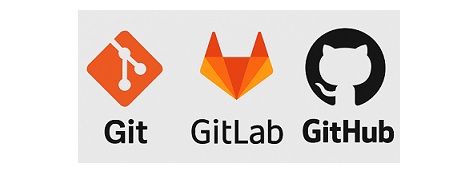Understanding Git Management Systems: Git, GitLab, and GitHub Explained

In modern software development, effective version control and collaboration are crucial. Whether you’re a solo developer or part of a large enterprise team, managing code efficiently helps ensure stability, traceability, and productivity.
Among the most popular tools for this purpose are Git, GitLab, and GitHub. Although these names are often used interchangeably, they represent different components and services within the ecosystem of source code management.
This article will explain the differences between Git, GitLab, and GitHub, their key features, and how they work together in modern DevOps environments.
1. What Is Git?
Git is a distributed version control system (VCS) created by Linus Torvalds in 2005, primarily to manage the Linux kernel’s source code.
It allows developers to track changes, revert to previous versions, create branches, and collaborate on code efficiently.
🔹 Key Features of Git:
- Distributed architecture – Every developer has a full copy of the repository, including history, on their local machine.
- Branching and merging – Enables parallel development and experimentation without affecting the main codebase.
- Speed and efficiency – Operations like commits, diffs, and merges happen locally, making them extremely fast.
- Integrity – Git uses SHA-1 hashing to ensure data integrity for every commit.
- Offline work – Developers can work without an internet connection and synchronize later.
🔹 Common Git Commands:
git init– Initialize a new repositorygit clone– Clone an existing repositorygit add– Stage changes for commitgit commit– Record changes to the repositorygit push– Upload commits to a remote repositorygit pull– Fetch and merge changes from a remote repository
In short, Git is the foundation — the version control engine — upon which platforms like GitLab and GitHub are built.
2. What Is GitLab?
GitLab is a web-based DevOps platform built around Git. It provides a single application for the entire software development lifecycle, from version control to continuous integration and deployment (CI/CD).
Developed by Dmitriy Zaporozhets and Valery Sizov, GitLab began as an open-source alternative to GitHub and has evolved into a full-featured DevOps suite.
🔹 Key Features of GitLab:
- Git Repository Management – Create and manage Git repositories with built-in access control.
- CI/CD Pipelines – Automate build, test, and deployment processes directly within GitLab.
- Issue Tracking – Built-in issue management for agile workflows.
- Container Registry – Host and manage Docker containers.
- Security & Compliance – Vulnerability scanning, code quality checks, and audit reports.
- Self-Hosted Option – GitLab can be installed on your own servers for full control and data privacy.
🔹 GitLab Advantages:
- Fully integrated DevOps lifecycle tools.
- Open-source edition available for customization.
- Strong CI/CD pipeline automation.
- Ideal for enterprises that require on-premises solutions and security compliance.
🔹 Example Use Case:
A company developing an internal banking system might use GitLab Self-Managed to host its code securely, with automated CI/CD pipelines to deploy updates to its internal infrastructure.
3. What Is GitHub?
GitHub is the world’s most popular cloud-based Git repository hosting service. Founded in 2008 and acquired by Microsoft in 2018, GitHub provides tools for collaboration, project management, and open-source contribution.
Unlike GitLab, GitHub initially focused on social coding, allowing developers worldwide to share and collaborate on projects easily.
🔹 Key Features of GitHub:
- Repository Hosting – Cloud storage for Git repositories.
- Pull Requests – Simplify collaboration through code reviews and discussions.
- GitHub Actions – Built-in CI/CD automation workflows.
- GitHub Issues & Projects – Lightweight project management tools.
- Community and Open Source – Millions of public repositories for learning and contributing.
- GitHub Pages – Host static websites directly from repositories.
🔹 GitHub Advantages:
- Massive open-source community and visibility.
- Easy collaboration through pull requests and forking.
- Seamless integration with third-party tools (e.g., Slack, Jira, Trello).
- Built-in security scanning and dependency management.
🔹 Example Use Case:
A developer building an open-source AI library can host the project on GitHub, collaborate with contributors worldwide, and use GitHub Actions to automate testing and deployment.
4. Git vs. GitLab vs. GitHub: A Quick Comparison
| Feature | Git | GitLab | GitHub |
|---|---|---|---|
| Type | Version Control System | DevOps Platform | Git Repository Hosting Service |
| Creator | Linus Torvalds | Dmitriy Zaporozhets & Valery Sizov | Tom Preston-Werner, Chris Wanstrath, PJ Hyett |
| Hosting | Local | Cloud / Self-Hosted | Cloud-Based |
| Main Function | Track code versions | End-to-end DevOps | Code collaboration & hosting |
| CI/CD | Not built-in | Integrated | Available via GitHub Actions |
| Issue Tracking | No | Yes | Yes |
| Open Source | Yes | Partially | Mostly closed-source |
| Best For | Version control | Enterprise DevOps | Open-source projects & collaboration |
5. When to Use Each
- Use Git when you need only version control — simple, fast, and decentralized.
- Use GitLab when you want a full DevOps solution with CI/CD, security scanning, and issue tracking in one platform.
- Use GitHub when you prioritize open-source collaboration, global visibility, and easy integration with external tools.
6. Conclusion
Understanding the differences between Git, GitLab, and GitHub helps you choose the right tool for your development workflow.
- Git forms the foundation — a robust distributed version control system.
- GitLab extends Git with a complete DevOps pipeline.
- GitHub focuses on collaboration, community, and open-source innovation.
In essence, all three play vital roles in modern software engineering, empowering developers to write better code, collaborate effectively, and deploy faster.
The installation process for Git, GitLab and GitHub can be found here :
How to Install Git on Ubuntu 24.04
How to Install GitLab CE (Community Edition): on CentOS Stream 9: A Step-by-Step Guide
How to Move the Complete Git Repository
How To Install GitLab on Ubuntu 22.04